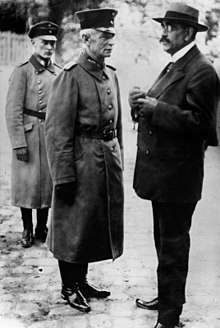Walther von Lüttwitz
German Revolution of 1918–1919 Walther Karl Friedrich Ernst Emil Freiherr[1] von Lüttwitz[2] (2 February 1859 – 20 September 1942) was a German general who fought in World War I. Lüttwitz is best known for being the driving force behind the Kapp–Lüttwitz Putsch of 1920 which attempted to replace the democratic government of the Weimar Republic with a military dictatorship.
[3] His father was Ernst von Lüttwitz (1823–92), an Oberförster ("head forest warden"), Hauptmann (captain) and Deichhauptmann ("overseer of dikes").
His mother was Countess Cecile (1835–1910), the daughter of Count Heinrich Strachwitz von Groß-Zauche und Camminetz.
[3][5] With Emmich's death on 22 December 1915, Lüttwitz was formally named commanding general of the corps, which he led until 20 August 1916.
[3][5] On 21 August 1916, he became Chief of Staff of the 5th Army (whose commander-in-chief was Prince Wilhelm) and managed to minimize the military fallout from the drain on resources of the Battle of Verdun.
[3][4] He was called "Father of the Freikorps" as he relied heavily on these paramilitary units in late 1918 and early 1919 after the regular troops had turned out to be unreliable.
[4] In this function, he directed the suppression of the Spartakus Uprising by the Freikorps in January 1919 under the orders of Minister of Defence Gustav Noske.
[3] However, even at that time, Lüttwitz was making political demands outside the area of responsibility of a military commander, like outlawing strikes and abolishing unemployment insurance.
As early as July 1919, Lüttwitz was involved in plots to topple the Weimar Republic and replace the government of Friedrich Ebert with a military dictatorship.
Lüttwitz, drawing on demands by the right-wing parties and adding his own, now demanded the immediate dissolution of the National Assembly, new elections for the Reichstag, the appointment of technocrats (Fachminister) as Secretaries for Foreign Affairs, Economics and Finance, the dismissal of General Walther Reinhardt as Chef der Heeresleitung, his own appointment as supreme commander of the regular military and the revocation of the orders of dissolution for the Marinebrigaden.
These included DNVP member Wolfgang Kapp, retired General Erich Ludendorff, as well as Waldemar Pabst and Traugott von Jagow [de], the last Berlin head of police in the old Reich.
[3] Although the putsch received support from military commanders and other conservative and monarchistic groups around the Reich, the rank and file of the bureaucracy mostly refused to cooperate.
After negotiations with those members of the legitimate government who had remained in Berlin, Kapp resigned on 17 March, but Lüttwitz tried to hold on for another day as head of a military dictatorship.
Schiffer also suggested Lüttwitz should leave the country until the National Assembly had decided on the question of an amnesty and even offered him a false passport and money.
His son was Smilo Freiherr von Lüttwitz who served as a General in World War II and in the early Bundeswehr.
